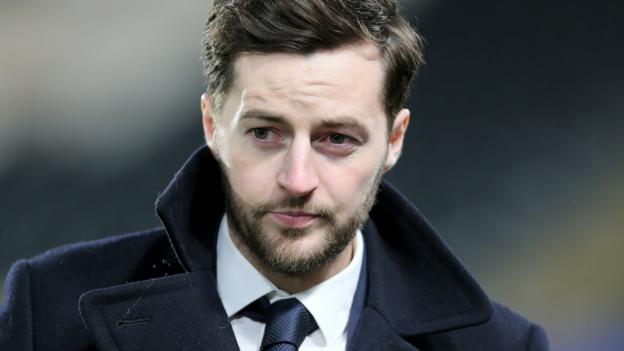
Former Tottenham, Hull and England midfielder Ryan Mason has called for a ban on children heading footballs to be introduced.
The 27-year-old was forced to retire in February 2018 after suffering a fractured skull during an aerial challenge in a Premier League game against Chelsea 13 months earlier.
A ban would emulate rules in the United States, where under-11s are outlawed from heading by the the US Soccer Federation – with limitations in place for players between 11 and 13.
“If you have got a seven- or eight-year-old heading a solid ball, and his brain and his bone in his skull isn’t fully developed, then that could potentially be doing damage,” Mason told BBC London.
“I look at some kids and they head the ball with the top of the head and their technique is all wrong, therefore the pressure that it’s putting on the brain is a lot more.
“I don’t think kids should be heading real balls.”
The Professional Footballers’ Association (PFA) has previously called for restrictions for youngsters to be introduced in the UK until the long-term health risks of heading are better understood,
“The older you get, you get more experience and your heading technique gets better,” said Mason, now a youth coach at Spurs.
“Maybe bring in sponge balls to learn the technique and gain that experience of actually challenging for a header.
“I don’t think repetitive heading at a young age is doing the kids any good, that’s for sure.
“America is probably more advanced than England in terms of research, and they’ve taken the measure of actually banning it up to a certain age. So maybe we can follow those footsteps over here to protect our young kids.”
Mason was forced to retire after suffering a fractured skull in an aerial challenge with Gary Cahill during a Premier League game in January 2017
Players ‘need more protection’
Mason is also urging football authorities need to do more to protect players from the effects of concussion.
“For me it’s pretty simple to diagnose concussion on a football pitch,” he said. “If there’s any doubt about it, then in my eyes, they should take the player off the pitch.
“Ultimately the specialists that I’ve seen and spoken to, if you do get a whack on the head and there’s a small sort of concussion, and then you go and get another whack on the head within minutes, then that’s when the damage can be done.
“And I think that’s where we can potentially protect the players a lot more.”
The Football Association says it is “committed to researching and examining all areas” of head injuries in the game, including the long-term effects on players.
Ryan Mason won one cap for England in a friendly against Italy in March 2015
The FA’s action followed a campaign by the family of former West Brom and England striker Jeff Astle, who died aged 59 in 2002 from a brain condition normally linked to boxing.
“We have commissioned comprehensive and rigorous research studies in this area, in collaboration with the Drake Foundation and the PFA, which are currently ongoing,” an FA spokesperson said.
“These studies will help establish whether or not there are any risks associated with playing football.”
Brain injury association Headway has called for more research to be undertaken into the effects of head injuries.
“We understand just how easy it can be to sustain an injury which can change your life,” said Peter McCabe, the charity’s chief executive.
“We think it has taken a very long time for football to get involved with research.
“There needs to be proper studies funded by all the money that is pumping into the game to ensure the safety and wellbeing of the players. They have a duty of care.”
Be the first to comment